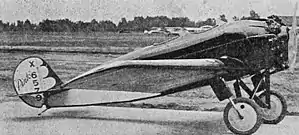Mohawk M-1-C
The Mohawk M1C (variously named Pinto, Redskin or Spurwing) was a 1920s American two or three-seat low-wing monoplane designed and built by Mohawk Aero Corporation of Minneapolis, Minnesota. One M1C was evaluated by the United States Army Air Corps in 1930 as the YPT-7 Pinto for use as a primary trainer.[1]
| M1C | |
|---|---|
 | |
| Role | Training monoplane |
| National origin | United States |
| Manufacturer | Mohawk Aircraft Corporation |
| First flight | 1929 |
| Number built | 7 |
Design and development
The M1C was a three-seat low-wing cantilever monoplane which was available with an open cockpit (as the Pinto) and enclosed cockpit (as the Redskin).[1] The first variant was the M1C-K powered by a 100 hp (75 kW) Kinner K-5 or a 100 hp (75 kW) Wright engine.[1] One aircraft was modified for evaluation by the United States Army Air Corps as the YPT-7 Pinto.[1][2]
A two-seat variant the M1C-W was also produced with a 110 hp (82 kW) Warner Scarab engine.[1] The first one was the aircraft evaluated by the Army and re-engined. In 1930 the company went bankrupt and was taken over by the R R Rand Jr.[1]
Variants
Specifications (M1C-K)

Data from Specifications of American Commercial Airplanes[3]
General characteristics
- Crew: 1
- Capacity: 1 passenger
- Length: 24 ft 2 in (7.37 m)
- Wingspan: 34 ft 11 in (10.64 m)
- Height: 7 ft 7 in (2.31 m)
- Wing area: 145 sq ft (13.5 m2)
- Empty weight: 1,125 lb (510 kg)
- Gross weight: 1,800 lb (816 kg)
- Powerplant: 1 × Kinner K-5 , 90 hp (67 kW)
Performance
- Maximum speed: 115 mph (185 km/h, 100 kn)
- Cruise speed: 95 mph (153 km/h, 83 kn)
- Range: 550 mi (890 km, 480 nmi)
- Service ceiling: 18,000 ft (5,500 m)
- Rate of climb: 1,100 ft/min (5.6 m/s)
References
Notes
- "American airplanes: Mi - Mu". www.aerofiles.com. 8 March 2009. Retrieved 2010-02-16.
- Andrade 1979, p. 158
- Aviation March 22, 1930, pp. 607, 609, 611.
Bibliography
- Andrade, John (1979). U.S.Military Aircraft Designations and Serials since 1909. Midland Counties Publications. ISBN 0-904597-22-9.
- "Specifications of American Commercial Airplanes". Aviation. Vol. 28, no. 12. March 22, 1930. pp. 606–611.